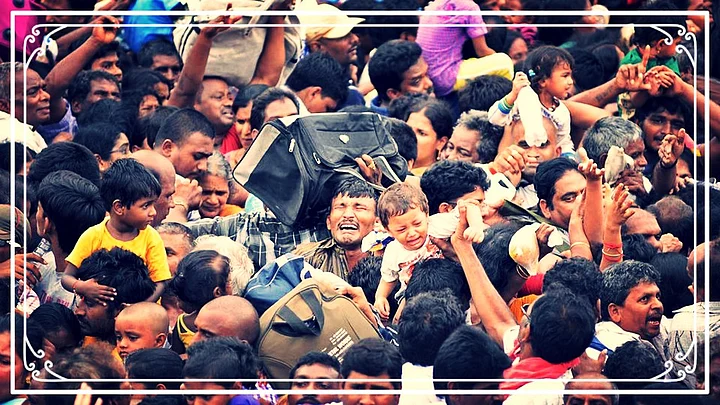Have you ever wondered why every stampede looks the same in India? A religious gathering, a rumour and a few lives are gone, like a dry leaf crushed underfoot. Who cares? Life is so cheap here, who asked them to be so religious? This is the common reaction after every faith-related event goes horribly wrong.
What causes these casualties? And who is responsible? Anyone can point out that the security arrangements were inadequate, there was no clear planning by the organisers and the crowd swelled many times so all the arrangements were not enough. But ultimately, it's a law and order problem, where the state is directly responsible.
That's why after any such tragedy, a life become commodity and the victim’s family will be compensated with a cheque with a few zeroes on it.
Stampedes at religious sites can usually be categorised into two types. One is where a temple or other place of worship is the site of the tragedy. The second involves a religious figure and his or her ashram, where a specific day is traditionally celebrated. Similarly, there are two types of followers. One category is which comes to fulfil a pledge or to worship a deity on a particular day. The second comprises disciples who congregate to remember a revered soul and to seek his or her blessings.
Surely the organisers are responsible for informing the local administration about a special day when a crowd is expected. But the real question is: Who shoulders the greater responsibility?
The state, in theory, has to protect faith and religious practice objectively. However, the involvement of policy makers in religion for gaining certain benefits make the matter murky. The state can't protect a religion when it uses it as a tool to win something. We’ve clearly seen that religion plays a key role in politics, society and culture. It's become a multidimensional and complex challenge to root out religion from every sphere.
The state organises religious events; the world largest fair Kumbh is a state-run affair. The state also gives unprecedented benefits to religious trusts. It appoints trustees to rich temples and also takes responsibility to provide all facilities at religious occasions. The state gives immense protection to religious-based practices.
There are many incidents when the state behaved as caretaker on behalf of the event organisers, who ignored the basics. Assuming that arrangements made for 3000 people can serve one lakh visitors can prove disastrous. Thus, a religious organisation can sometimes becomes the enemy of human rights. The state has to act firmly and punish the guilty.
The late Swami Dayananda, head of Arsh Vidya Pitham, had filed a writ petition in the Supreme Court. It challenged the constitutional validity of various provisions of the Hindu Religious Institutions and Charitable Endowment Acts of Tamil Nadu, Andhra Pradesh and Puducherry. In the case pertaining to the Chidambaram temple of Tamil Nadu, the Supreme Court had barred the government from controlling it. This was in 2014. Yet, in India today all the rich temples are controlled by the state or central governments.
Interestingly, the state also gets help from progressive voices seeking to curb the lack of transparency in temple administration. Such voices then demand that the state gets involved in the temples’ administrative functions. For instance, after the death of Puttaparthi Satya Sai Baba, the Andhra government issued some guidelines to the ashram administrators and withdrew some concessions.
A few days back, a few progressive groups also demanded that the Mahabaleshwar Temple in Gokarna, Karnataka, be brought under the state’s administration. The irony is that the state can't manage religious events and affairs in the first place, which ends up harming or taking the lives of devotees.
When a fireworks tragedy kills more than 100 in Kerala, when 27 are crushed on the banks of the Godavari, when Bohra Muslims lose 18 brethren mourning for their departed leader, the question arises: Who is really responsible?
The state has immense power to control the flow of followers rushing like uncontrolled water. But faith is an impediment. It gives power to administrators of a place of worship, making them irresponsible and arrogant. An ashram believes that it encompasses divine territory, where every sin can be washed away. But ignoring the true value of a follower can make faith shaky.
A horrible stampede where hundreds are crushed due to a human lapse can be avoided if the state acts objectively and truly serves the common man.
(The writer is a former TV journalist and member, International Association of Religion. He can be reached at @MeBhavya. This is a personal blog and the views expressed above are the author’s own. The Quint neither endorses nor is responsible for the same.)
